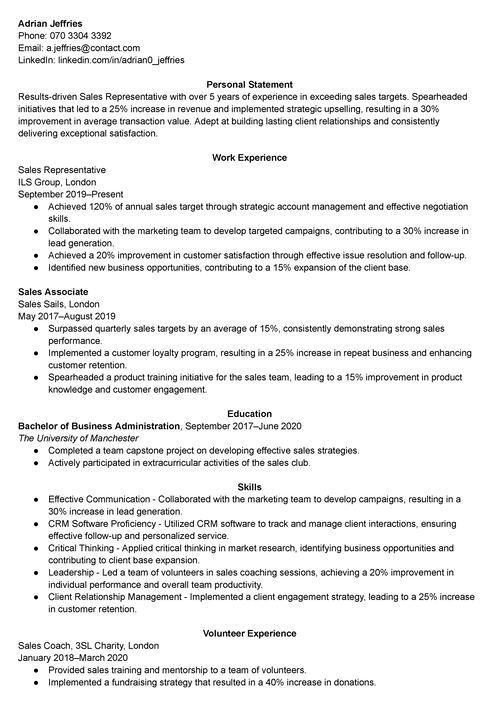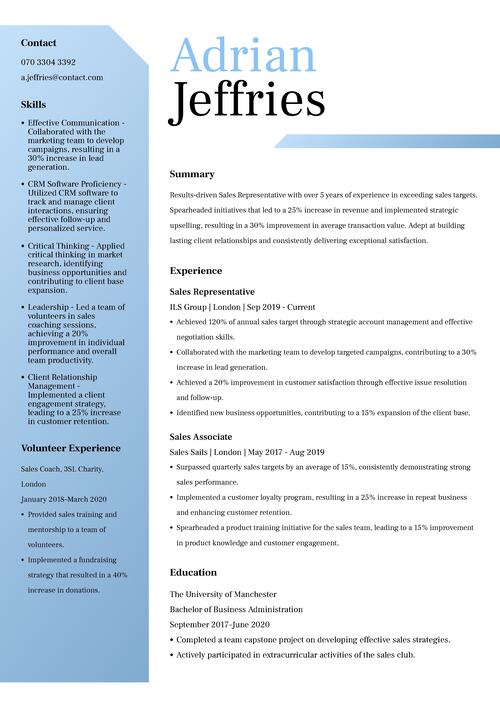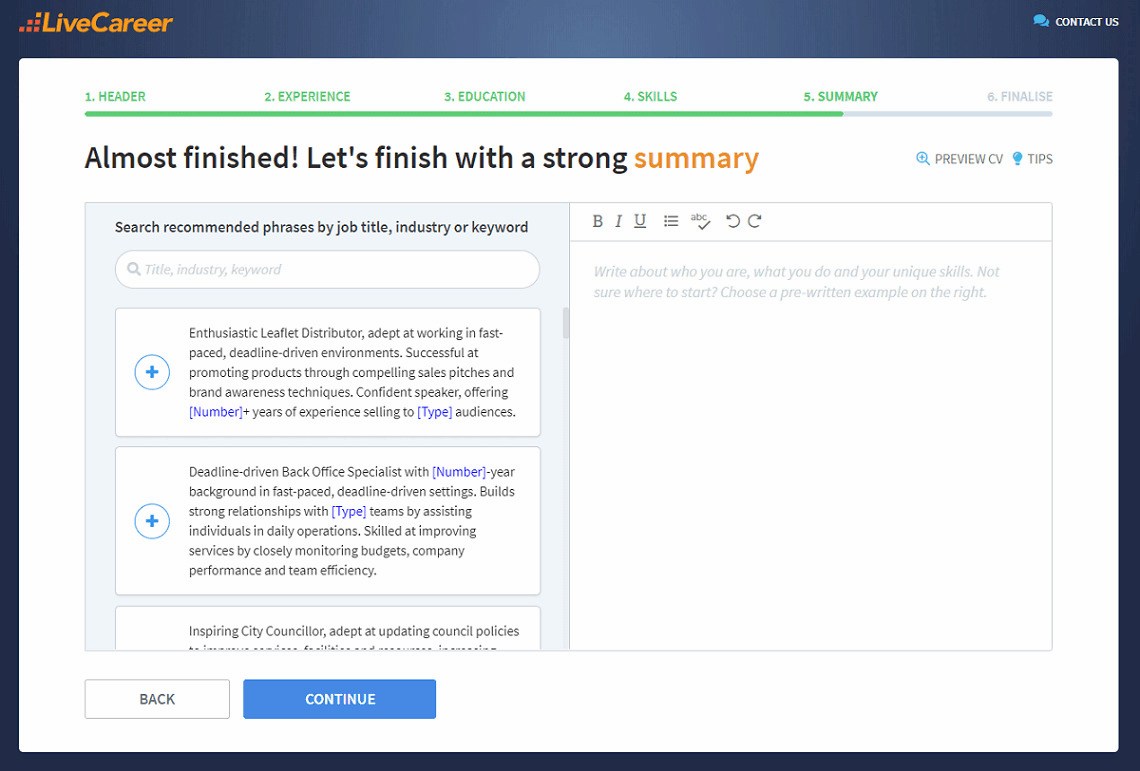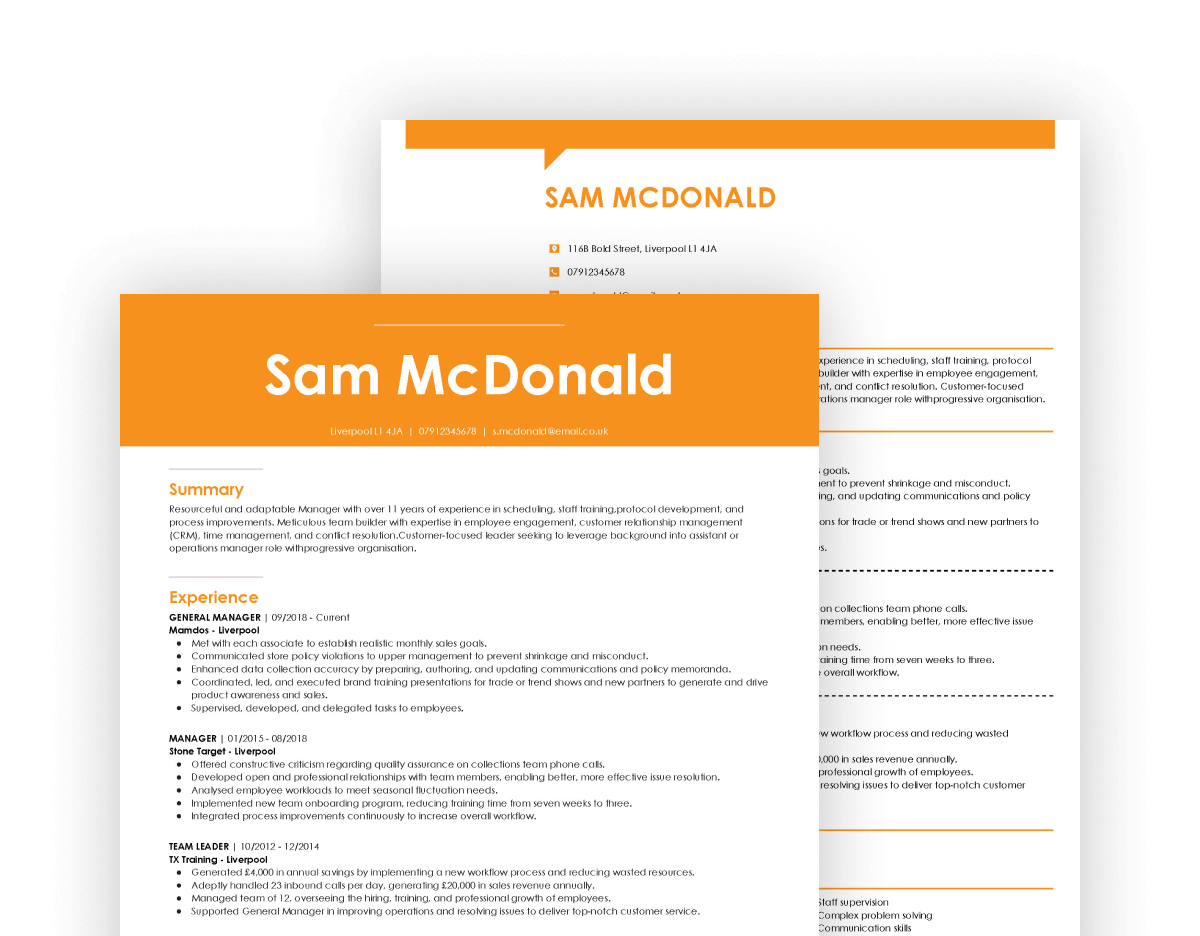Create a professional CV now!
 NO
NO YES
YESOur customers were hired by:
In the sea of job applications, the struggle to stand out is real. Your CV seems flooded with qualifications, yet the perfect opportunity remains elusive. Your pain point is clear: despite the effort, the right doors aren't opening.
The key? Unveiling the specific job skills that employers crave. I'll show you the top ten in-demand flexible skills for all jobs that will transform your job search.
Read on to learn more about job skills sought after by employers in the UK and how to showcase them on your CV.
Create an effective CV in minutes. Choose a professional CV template and fill in every section of your CV in a flash using ready-made content and expert tips.
Create a professional CV now!
 NO
NO YES
YESWe created the sample on the right using our builder. See other good CV examples like this one.
Looking to push your career and CV writing skills further? Read:
Job skills encompass a broad spectrum of competencies. Some are specific to your desired job, like knowing how to use certain tools or computer programs (technical skills). Others are about how you work with people, solve problems, and communicate (soft skills).
So, job skills (also referred to as transferable skills) are the abilities you bring to work that help you do your job well. As you can see in this study made by ManpowerGroup, 77% of employers globally report difficulty finding the skilled talent they need. In the UK, this number is as high as 80%. This makes it a significant opportunity for job applicants, as candidates possessing these sought-after abilities have a distinct advantage. You can position yourself as a valuable asset by aligning your skill sets with the in-demand abilities employers seek. All you need is to have these job skills and show them correctly on your CV.
Employers across various industries consistently seek candidates who possess a mix of technical and soft skills to navigate the complexities of the modern workplace. I picked 10 of them, which are considered to be some of the most crucial in multiple industries, as highlighted by the ManpowerGroup, McKinsey, Access Group, and the UK government. These are:
Let’s discuss each one of them in more detail:
Knowing how to work with data and operate various common programs, like the MS Suite, is important in nearly every industry. Having good IT skills means you can plan smart strategies, understand what customers want, and solve problems effectively. Companies really value people with this job skill. It's not just about numbers; it's about understanding what they mean and using that to succeed at work. If you're good with data, it can open up lots of opportunities and help you stay relevant.
Communication skills help you express yourself clearly and work well with others. When you can talk and write effectively, it makes everything at work smoother. It's not just about using big words; it's about ensuring people understand your words. This work skill improves teamwork and is crucial when explaining ideas or solving problems with your team.
Adaptability skills are crucial because they help you navigate changes and new situations with ease. Being adaptable means adjusting to different environments and challenges without getting overwhelmed. It also shows the willingness to learn and try new things. In the working world, things can change quickly, and employers really value people who can go with the flow and find solutions, even in unexpected situations. So, having strong adaptability skills not only makes you more resilient but also makes you stand out as someone who can handle whatever comes your way.
Being a strong problem-solver means adapting to unexpected situations, making informed decisions, and actively contributing to finding the best solutions. Whether in technical domains like medicine or service-oriented roles like administrative support, there is a universal demand for workers with this job skill, who can creatively overcome obstacles and contribute to a more efficient workplace.
Critical thinking skills are immensely valuable in the workplace, empowering you to analyse various situations. Developing strong critical thinking skills makes you a reliable team member and equips you with a versatile toolset applicable across various job environments, setting you up for success in the professional world. Critical thinking often goes hand in hand with problem-solving and decision-making transferable skills.
Creativity skills mean thinking outside the box, coming up with fresh ideas, and finding inventive solutions to challenges. Employers value individuals who can bring a creative perspective to their work, whether in a field like graphic design or even administrative tasks. For example, in a marketing role, this job skill might involve developing engaging content or devising unique strategies to attract customers. Creative thinking isn't limited to specific jobs; it's a vital personal skill that can enhance your problem-solving abilities and make you stand out in any role.
Leadership skills are crucial in the workplace, especially in managerial positions, as they involve guiding and inspiring others to achieve common goals. Effective leaders use this work skill to communicate clearly, make decisions, and motivate their team to perform at their best. For instance, in a managerial role, strong leadership might mean setting clear expectations for team members, providing guidance on tasks, and fostering a positive work environment. Employers highly value individuals who can take initiative, make sound decisions, and inspire others, contributing to the overall success of a team and organization.
Teamworking skills are important, a key job skill contributing to a positive and productive work environment. These skills involve collaborating with colleagues to achieve shared goals, communicate effectively, and contribute positively to the team dynamic. For example, in a project team, good teamwork skills mean working well with others, sharing ideas, and collectively finding solutions to challenges. Employers appreciate those who can work effectively in a team, recognizing that collaboration often leads to innovative ideas and potentially successful project outcomes.
Engineering skills are essential for many industries, and there is a universal demand for employees with these job skills. Engineers bring valuable problem-solving and critical thinking skills to the workplace, whether designing new products, improving processes, or addressing complex challenges. Their ability to contribute to efficient solutions makes them indispensable assets. The impact of a gap in engineering skills translates to almost every industry.
This fundamental job skill involves prioritizing tasks, setting realistic deadlines, and organizing work effectively. Employers value workers who can manage their time well, since it directly impacts the quality and timeliness of work. Developing strong time management skills helps employees meet deadlines, achieve goals, and contribute to a more organized and less stressful work environment. This personal skill is especially vital for all remote and freelance jobs, as it proves self-motivation.
Choosing the right job skills for your CV involves thoughtfully evaluating the job requirements you're applying for. Start by carefully reading the job description and noting the skills mentioned. For example, when they are “looking for a team player,” the company wants their employee to have well-developed teamwork skills.
Identify the key technical and soft skills the employer values. Next, assess your own skills and work experiences. Highlight those that align with the job requirements.
Consider including a mix of technical skills relevant to the industry and soft skills demonstrating your ability to collaborate, communicate, and problem-solve. Especially since some consider soft skills to be the key job skills that employees need to succeed in their careers.
Here’s a walkthrough on putting job skills on your CV:
The first place where you can show your personal skills is your CV summary or CV objective. This brief but impactful section is your professional introduction, allowing you to showcase key attributes. Here’s an example:
Results-driven Sales Representative with over 5 years of experience in exceeding sales targets. Spearheaded initiatives that led to a 25% increase in revenue and implemented strategic upselling, resulting in a 30% improvement in average transaction value. Adept at building lasting client relationships and consistently delivering exceptional satisfaction.
This CV profile shows multiple job skills. From sales and negotiation, through team collaboration, to leadership. These skills collectively paint a comprehensive picture of a sales professional with a strong track record of achieving results, building and maintaining client relationships, and implementing strategic initiatives.
A strong CV summary will convince the recruiter you’re the perfect candidate. Save time and choose a ready-made personal statement written by career experts and adjust it to your needs in the LiveCareer CV builder.

The profile isn’t the only section of a CV where you can showcase your personal skills. This is how you can incorporate job skills into your work history:
Sales Representative
ILS Group, London
September 2019–Present
These professional work achievements prove several job skills. The first shows negotiation and strategic planning, the second presents strong communication, and the third showcases empathy and conflict resolution.
Next, let’s move to the education section, an important place to showcase your work skills when writing a CV with no experience.
Bachelor of Business Administration, September 2017–June 2020
The University of Manchester
These activities show this candidate’s teamwork skills and general sales and financial abilities.
As the name suggests, this part of your CV is all about your personal skills. Tailor them to the job ad, and remember to include a quantified achievement for each one to prove your expertise.
This section is great, as you can showcase all the job skills you want simply. Keep in mind that you don’t want to overwhelm the recruiter. 5 skills is a sweet spot.
The last places to present your personal skills are your extracurricular activities sections. Below, I use volunteer experience as an example.
Volunteer Experience
Sales Coach, 3SL Charity, London
January 2018–March 2020
This section shows our candidate possesses leadership and strategic planning job skills.
To sum up, include mentions of your skills, not only in the skill section but also in your work history, CV profile, and bonus sections, such as your hobbies & interests. Tailor your skills section to reflect the most sought-after competencies in your field of work.
Continuous improvement is a skill in itself. And it’s something each one of us does practically every day, even if we don’t realise it. But, there are some specific ways that offer focused improvement of your job skills.
Embrace a mindset of lifelong learning by regularly participating in workshops, online courses, and industry seminars. This not only enhances your current work skills but also keeps you abreast of the latest industry trends and technologies. Continuous learning demonstrates adaptability and a commitment to staying relevant in the industry.
Actively seek feedback from colleagues, supervisors, or mentors. Constructive criticism helps identify areas for improvement and allows you to refine your skills. Embracing feedback demonstrates a willingness to grow, adapt, and enhance your performance.
Engage in professional networking, both within and outside your organization. Collaborating with professionals from diverse backgrounds exposes you to different perspectives and approaches, enriching your skill set. Networking also creates mentorship and knowledge exchange opportunities, fostering a collaborative work environment and potentially leading to career advancement.
Stay tech-savvy and leverage automation tools relevant to your field. Embracing technology enhances efficiency and productivity, allowing you to focus on higher-value tasks. For example, mastering project management software can streamline workflow, showcasing your ability to adapt to modern work methods and improving overall team effectiveness.
Establish mentor-mentee relationships, both traditional and reverse mentorship. Learning from experienced professionals provides valuable insights and guidance, accelerating your skill development. Simultaneously, engaging in reverse mentorship, where you mentor someone with expertise in areas you wish to improve, enhances your leadership and communication skills.
You don’t have to be a CV writing expert. In the LiveCareer CV builder you’ll find ready-made content for every industry and position, which you can then add with a single click.

Thank you for reading this article about work skills. If you have any questions at all about job skills for your CV, please ask in the comments section. We’ll always gladly help.
Our editorial team has reviewed this article for compliance with Livecareer’s editorial guidelines. It’s to ensure that our expert advice and recommendations are consistent across all our career guides and align with current CV and cover letter writing standards and trends. We’re trusted by over 10 million job seekers, supporting them on their way to finding their dream job. Each article is preceded by research and scrutiny to ensure our content responds to current market trends and demand.
About the author
Since 2013, the LiveCareer UK team has shared the best advice to help you advance your career. Experts from our UK editorial team have written more than one hundred guides on how to write the perfect CV or cover letter.
Rate this article:
Job skills
Average:

See when to use a skills based CV and how to write it for the UK job market. Learn from the free skills based CV examples and download a functional CV template.
You’ve got your shirt, your tie, and your shiny shoes—you’re presentable. But can you present? Brush up on your presentation skills and prove you’re more than just a pretty face.
Key project management skills are more than just being friendly and using agile methodology. This guide will help you leverage them effectively on your CV.
Our customers were hired by: